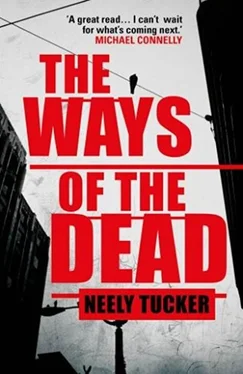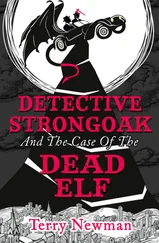The woman looked at Sly, who nodded. She pulled her glasses, hanging on a thin gold chain around her neck, up to her eyes, and opened them wider. She slid her feet across the floor and sat down at the table. She leaned down over it, then reached out a finger and tapped the picture.
“Long time, but I know him. He came to see she over there across the street. Saturday mornings. Sometime Fridays.”
“Which she are we talking about?”
“She. The bad one. She from Manchester parish. She had the devil in her.” She tapped the picture of Noel.
“When was the last time you saw her? Noel?”
She shrugged. “Not since nobody saw her no more.”
“And how long before? How long was he coming over there?”
“I have no notebook,” she said. “But six months. Maybe even one year.”
“And you’re sure? Absolutely sure?”
She nodded. “The white devils around here are few.”
Sly slapped a fist onto the table. “And did you think , did you one goddamn time think , that I might want to know that information? That the goddamn chief judge of the U.S. District Court was fucking a college student in my neighborhood? Four blocks from my goddamn house ?”
The woman took one step back to the stove and, lightning quick, snatched a knife off the countertop and stepped back, the blade toward Sly’s throat. It had seemed a single motion, slippery as mercury and as quick.
“It is my house! My house! You black Americans have no respect! I have no fear from you!” She held the blade out, three inches from Sly’s neck, the blade steady.
Sly regarded her with a glare. He spoke softly and with menace. “I pay you, Mommy.”
“You didn’t tell me who this one was! I told you a white man came to see a black girl on the street and you say to me, ‘So what?’”
Sly blinked and sat back in the chair. He thought for a moment, his eyes still on the woman. His hands were flat on his legs. He raised one hand and then softly put it back down, tapping the leg, one two three, a gesture of recognition, of defeat. “I did,” he said, finally. “You did. I was in the middle of-I did.”
The woman went back to her pot and put the knife down. It was quiet.
After a minute, Sully whispered to Sly, “I can’t use it if I don’t have her name.”
“Tell him your name, please, Mommy,” Sly said. He looked like he had a migraine.
“Is it in the paper?”
“Yes.”
“I don’t want it so.”
“I didn’t ask you, woman.”
She stared at him and then looked back at Sully. Her tone softened. “Marilyn Winston,” she said. “You will keep me safe.” This was directed at Sly. He nodded, rubbing his forehead.
“Ms. Winston, I have to ask, what is your profession? Or what was your profession if you are retired?”
“Why you need that?”
“Mommy. Jesus. Please.”
“Nurse. I was a nurse at the Washington Hospital Center for twenty-five years. In the intensive care ward.”
***
The idea floated around his mind for an hour before he screwed up the nerve to actually do it. He was sitting at Stoney’s, nursing his second Basil’s, the night getting late, looking up at the television behind the bar, listening to the desultory chatter around him. He pulled out his cell and looked at it.
He didn’t want to make the call. He also didn’t see any way of not making the call.
The 411 operator answered on the third ring, and he said in a resigned sigh, “A residential for Lorena Bradford, living in the District or maybe, I guess, in Prince George’s County, Maryland.” There was typing on the other end. He rattled the ice in his drink and looked at it without hope. Then she said, “Currently not showing any Lorena Bradford in the District of Columbia or surrounding counties in Maryland, but I do have five L. Bradfords.”
“How many can you give me without me calling back?”
“Two.”
“Let’s do it.”
She read the numbers and he wrote them on a cocktail napkin, then looked at his watch. A little after nine. It was late but not radically so. He pressed the numbers and wondered what hell Sly was inflicting on his network of neighborhood sources, who had failed to notice a district court judge wandering up and down Princeton Place. That wasn’t going to be pretty.
The first two numbers the operator gave him both went to answering machines, with a male voice on each one. He pegged each of them to be white, and crossed them off. Noel’s sister had not seemed like the interracial type.
Hers was the fourth number. She picked up and he recognized her voice immediately.
“Miss Bradford, hi, sorry to call you so late, but it’s Sully Carter at the paper. I know you made it pretty-”
“You the one at the cemetery?”
“Yes. And I wouldn’t-”
“I’m glad you called,” she said. There was a breath and her voice shifted to a softer, more feminine tone. “I wanted to apologize for that-that scene. I lost your number and then the idea just got lost, too. I-I shouldn’t have done that. Spit on you, I mean. I can’t believe you came to the funeral to interview me-that was just plain wrong-but that doesn’t make what I did right.”
Phone crooked between his shoulder and his ear, raising his hands in front of him, good god, people, you just never knew…
“Don’t worry about it,” he said. “But-I didn’t like being there myself-thank you. I am still interested in what happened to your sister, though. There has been some information that has come to my attention that I just can’t avoid, about one of her relationships, and I would like to come by to talk to you about it, to see if-”
She said, “Is this about David?”
The District is a diamond-shaped city, elongated north to south, and Lorena Bradford lived in the far northern tip, at the apex of the diamond, at the top of Rock Creek Park.
The house was on the 3000 block of Chestnut, about five blocks west of the park and about the same distance south from Western Avenue, which marked the Maryland line. On the north side of Western, you were in Chevy Chase. Property values skyrocketed, the public school system catered to parents who could afford private-school tuition, and the median income was double what it was on the south side of the street, in the District.
Lorena’s house, on the modest side of the divide, was a solid one-and-a-half-story redbrick bungalow, four steps up to a front patio and a dormer roof. She was at the door, opening it, already dressed for work, when he was halfway up the walk the next morning.
“What do you know about David?” he had asked, shell-shocked, the night before.
“A little,” she had said. “I sat up nights going through her things after she went missing. She kept datebooks. The Week-at-a-Glance things. ‘David’ or ‘D’ was written on each Saturday morning, and sometimes Friday evenings, in the months before she disappeared. That’s it. Why? Do you know who he is?”
When he told her what he thought he knew, there had been a very long pause. The invitation to her house followed.
Now, just over twelve hours later, he having barely slept, the long watch of the night filled with nightmare-filled patches of sleep and pacings of the house, sitting on the back step, wanting to call Dusty but feeling burned from the other night, the daylight never seeming to come, and now, finally, he was walking up the steps, calling out, “Not going in early, are you?” smiling, acting as if he were on top of the world, a man in control, motioning to her outfit. He was vaguely conscious of trying to make himself appear to be disarming. Gentle, he said to himself, gentle. Gentle. You are gentle . He saw her eyes flick away from his as he approached-the scars-before returning.
Читать дальше












